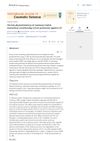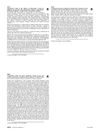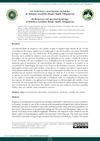 3 citations,
August 2021 in “The Open Dermatology Journal”
3 citations,
August 2021 in “The Open Dermatology Journal” The herbal hair serum improves hair quality and growth, and is a good alternative to traditional cosmetics because it doesn't contain harmful chemicals like parabens and sulphates.
 November 2023 in “Materials Today Bio”
November 2023 in “Materials Today Bio” Light therapy might help treat hereditary hair loss by improving hair follicle growth in lab cultures.
133 citations,
July 2020 in “Cells” Creating fully functional artificial skin for chronic wounds is still very challenging.
 16 citations,
October 2023 in “Molecular cancer”
16 citations,
October 2023 in “Molecular cancer” New treatments like nanotechnology show promise in improving skin cancer therapy.
 7 citations,
December 2021 in “Pharmaceutics”
7 citations,
December 2021 in “Pharmaceutics” Natural products like plant extracts can help promote hair growth and could be used to treat hair loss.
 39 citations,
June 2017 in “Journal of Applied Research on Medicinal and Aromatic Plants”
39 citations,
June 2017 in “Journal of Applied Research on Medicinal and Aromatic Plants” Plant-based ingredients are effective and safe for modern skincare products.
 8 citations,
September 2017 in “Journal of Natural Medicines”
8 citations,
September 2017 in “Journal of Natural Medicines” Applying an extract from Perilla frutescens helps hair grow and fights the effects of hair loss hormones.

Accurate diagnosis and tailored treatments are crucial for managing hair loss in humans and animals.
 March 2024 in “Tropical Journal of Natural Product Research”
March 2024 in “Tropical Journal of Natural Product Research” Many people in Fez-Meknes use potentially toxic plants for various health and cosmetic purposes, but more research is needed to ensure their safety.
 1 citations,
December 2013 in “Turkderm”
1 citations,
December 2013 in “Turkderm” Use of cosmeceuticals during pregnancy and breastfeeding is not recommended due to insufficient safety data.
 January 2002 in “Journal of Toxicology-cutaneous and Ocular Toxicology”
January 2002 in “Journal of Toxicology-cutaneous and Ocular Toxicology” Botanical extracts are increasingly important in cosmetics and drugs for their effectiveness and safety, backed by traditional use and scientific evidence.
 February 2024 in “ACS Omega”
February 2024 in “ACS Omega” The Shen Bai Hair Growing Decoction may help treat hair loss by promoting hair growth and reducing inflammation.
3 citations,
November 2022 in “Molecules/Molecules online/Molecules annual” The substances improved hair regrowth and protected hair cells in humans and mice.
1 citations,
February 2015 Rosemary is used for digestion, headaches, stress, memory improvement, hair growth, and aromatherapy.
December 2012 in “한국피부미용향장학회지” Different aroma oils are suited for dry, oily, or sensitive scalps based on their specific chemical compositions.
32 citations,
February 2020 in “PTR. Phytotherapy research/Phytotherapy research” Rosemary extract may boost the immune system, but more research on humans is needed to confirm this.
 September 2023 in “Apple Academic Press eBooks”
September 2023 in “Apple Academic Press eBooks” Rosemary has many health benefits and is used in medicine and cosmetics.
 August 2023 in “International Journal of Cosmetic Science”
August 2023 in “International Journal of Cosmetic Science” Rosemary extracts, specifically compounds like rosmarinic acid and carnosic acid, can protect hair from UV damage.
 December 2023 in “Research Square (Research Square)”
December 2023 in “Research Square (Research Square)” 12-Methoxy carnosic acid from rosemary might be a good natural treatment for hair loss.
 June 2017 in “Journal of The American Academy of Dermatology”
June 2017 in “Journal of The American Academy of Dermatology” 7.5% DEET lotion is more effective and safe at repelling mosquitoes than rosemary, citronella, and lemongrass lotions.
 December 2020 in “Rev. Amazon.”
December 2020 in “Rev. Amazon.” Monnina crassifolia, Aloe vera, and rosemary are commonly used for hair conditions in Angochagua, Ecuador.
 4 citations,
June 2011 in “Journal of Biomedical Research”
4 citations,
June 2011 in “Journal of Biomedical Research” Herbal extracts promoted hair growth similar to minoxidil in mice.
 May 2017 in “Journal of The American Academy of Dermatology”
May 2017 in “Journal of The American Academy of Dermatology” Finasteride 1 mg/day effectively treats hair loss in men aged 18-41 and over 41; DEET lotion works better than herbal insect repellents; combined tattoo removal technique shows no extra benefits.
 10 citations,
October 2019 in “Acta Pharmaceutica”
10 citations,
October 2019 in “Acta Pharmaceutica” Medicinal plants are used to treat skin conditions, but more evidence is needed before recommending them widely.
 6 citations,
March 2014 in “Herba Polonica”
6 citations,
March 2014 in “Herba Polonica” Plant extracts may help treat hormone-related hair loss.
 October 2024 in “Journal of Cosmetic Dermatology”
October 2024 in “Journal of Cosmetic Dermatology” Over half of young people in Saudi Arabia experience early gray hair, linked to factors like smoking, stress, and family history.
 282 citations,
October 2006 in “The Journal of Clinical Endocrinology and Metabolism”
282 citations,
October 2006 in “The Journal of Clinical Endocrinology and Metabolism” The Endocrine Society advised against routine testosterone therapy for women, citing a need for more research on long-term safety and a clear definition of androgen deficiency.
 251 citations,
October 2014 in “The Journal of Clinical Endocrinology & Metabolism”
251 citations,
October 2014 in “The Journal of Clinical Endocrinology & Metabolism” The guidelines advise against using testosterone and DHEA in women for most conditions due to safety and effectiveness concerns, but suggest considering testosterone for postmenopausal women with low sexual desire.
 237 citations,
January 2010 in “The Journal of Sexual Medicine”
237 citations,
January 2010 in “The Journal of Sexual Medicine” The report recommends personalized treatment for women's sexual dysfunctions and more research on effective therapies.
 177 citations,
July 2004 in “The Journal of Sexual Medicine”
177 citations,
July 2004 in “The Journal of Sexual Medicine” Experts recommend thorough medical, sexual, and psychosocial assessments for women's sexual dysfunctions, and suggest individualized treatment plans with regular check-ups. They also mention potential use of estrogen and androgen therapy, but with caution due to safety concerns.
























